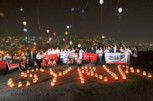
With the Syrian revolution entering its third year, big transformations have taken place in the country, which will help end the struggle there. These major transformations took place after the failure of UN envoy Lakhdar Brahimi’s efforts to solve the on-going political struggle and the attempts made by Muath Al Khatib, the Chairman of the Syrian National Coalition, to open a dialogue with the government. Meanwhile, the Syrian people’s agonies have only increased and that is something that can no longer be ignored by the international community.
The transformations can be summed up in two parts. The first is the Free Syrian Army’s successes, bringing it closer to victory. The second, and which is more important, entails the change that has taken place in the stance of the western world towards the conflict in Syria.
On the political side, an important development took place for the first time since the conflict started in Syria. Between March 23 and 24, the Syrian opposition held a conference in Cairo which was attended, for the first time, by 50 Alawites, who announced their solidarity with the opposition in bringing about the downfall of the regime. They also called upon other Alawites to join them in opposing the regime and calling for its downfall. In so doing, the Alawites have, in fact, sent more than one message to make sure that there is a distinction between the sect and Syrian President Bashar Al Assad.
One of its first messages was sent out to the Syrian regime itself — that has hijacked the sect and has taken its support for granted. The second message was directed at the Syrian people, making it clear that the Alawite sect’s aspirations and ambitions were in line with those of the Syrian people, who are striving to get rid of the totalitarian and dictatorial regime. Hence, the sect is trying to distance itself from being linked to Al Assad’s regime and does not want to be held responsible for its actions. The third message was directed at the international community, to highlight certain aspects of the Syrian conflict, which have often been misunderstood.
On the other hand, at the preparatory meeting for the Arab Foreign Ministers’ summit on March 24, it was decided to give Syria’s seat in the Arab League to the Syrian opposition — represented by the Coalition of the Revolutionary Forces, the opposition, and the interim government established by the coalition.
Yet, this political success achieved by the opposition was unable to hide its failures in other areas. The results of the Istanbul conference were not accepted by many active parties in the Syrian political arena. The manner in which Gassan Hitto was elected by the national coalition as head of the interim government was not welcomed by different blocs within the coalition and was not fully supported by the different factions of the Free Syrian Army.
The political scene has become even more murky with the initial resignation of Al Khatib, who has refused to follow the diktats of the Arab parties that are trying to contain the Syrian opposition. The international political atmosphere was electrified after chemical weapons entered the Syrian battlefield, with Khan Al Assal, in the rural areas of Hums, being hit by a missile which was believed to be carrying the Sarin nerve gas.
Internationally, there has been a change in the attitude of a number of western countries who decided to be actively involved in the Syrian conflict. After a period of hesitation and taking a negative stand on the Syrian crisis initially, these countries have now come closer to the option of direct intervention against the Syrian regime. The UK and France decided to arm the Syrian opposition despite the fact that this decision contradicted the European Union’s (EU) stand. However, the EU itself does not have a unified vision regarding the ban on exporting weapons to any part of the conflict in Syria. The stance adopted by these two countries is not surprising since both have cultural and historical relations with Syria since the beginning of the 20th century and both have contributed towards laying down its geographical boundaries after the collapse of the Ottoman Empire. As a result of this development, US President Barack Obama’s administration has announced through Secretary of State John Kerry that the US does not object to the arming of the Syrian opposition by some EU countries.
Although the US does not want to arm the Syrian opposition, it does wish for a quick end of the Syrian regime because in its view, prolonging the struggle will strengthen the Islamist groups, thereby giving them the chance to become forces that will have an effective role in shaping the future of Syria and that is something the US does not want.
Accordingly, we find that the US is offering military assistance that is no less important than arming the opposition. It is actually training chosen factions from the Free Syrian Army in one of Syria’s neighbouring countries and supplying them with precise and detailed intelligence inputs regarding the Syrian armed forces on the ground and their movements to give the opposition a better chance to take on these forces.
Finally, it is important to note that the Free Syrian Army’s military success, no matter how major, will not bring stability to Syria after the downfall of the Al Assad regime as long as the opposition’s political framework remains shabby and exposed to being ripped apart easily.
Dr Mohammad Akef Jamal is an Iraqi writer based in Dubai.







